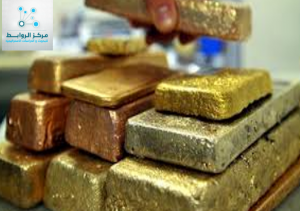BY: Shatha Kalel
Sudan’s gold exports have seen a significant increase despite the ongoing war, now in its 17th month. As investments slowed, and economic activities such as real estate and manufacturing came to a halt, Sudanese capital shifted towards traditional gold mining. The economic vacuum created by the destruction of factories and stalled commercial activity led many to turn to gold mining, bringing with it a ripple effect on various related industries.
Traditional Gold Mining: An Economic Lifeline
Sudan’s traditional gold mining sector is now a critical part of the economy, employing over two million people and producing roughly 80% of the country’s gold output. Spread across 14 of Sudan’s 18 states, this form of mining offers a lifeline to many, especially those displaced or without work due to the ongoing conflict. Workers in this sector, primarily laborers, extract and process gold manually using rudimentary tools like mills and metal detectors.
While traditional mining is a vital source of income, it also raises environmental concerns. Experts warn that the use of mercury to separate gold from rocks has severe health and ecological impacts. The mercury is often vaporized by heat, releasing toxic fumes that miners inhale, leading to lung and kidney issues over time.
Smuggling and Lost Revenue
Sudan’s reliance on gold as a primary source of foreign currency, especially after losing oil revenue with South Sudan’s secession in 2011, has become critical. However, around 50% of the country’s gold production is smuggled abroad, as miners seek to sell at international market rates. This widespread smuggling cuts deep into Sudan’s potential earnings, reducing the overall impact of gold exports on the nation’s economy. Officials estimate that if smuggling were curtailed, gold revenues could reach up to $7 billion annually.
Global Economic Impact and the Role of Globalization
Sudan’s increased reliance on gold and the smuggling issue have broader implications for the global economy. First, the black-market trade of Sudanese gold has led to distortions in global gold prices, as unregulated supplies enter international markets. Secondly, the smuggling networks demonstrate how globalization enables the free flow of goods across borders, but without the proper regulatory frameworks, it weakens local economies, as seen in Sudan.
The global demand for gold, particularly in countries like China and India, amplifies these effects. Sudan’s gold smuggling could contribute to economic disparities as the profits from gold mining benefit a few individuals rather than being reinvested in national development. The situation highlights a globalization paradox, where international trade is supposed to promote prosperity, but in this case, it exacerbates inequalities and fosters environmental damage.
Toward a Sustainable Gold Economy
Sudan’s government has recognized the need for reforms and has taken steps toward establishing a regulated gold market. Plans to open a gold exchange and refineries in major cities aim to curb smuggling and increase transparency in the sector. Additionally, efforts to shift from traditional mining to organized, mechanized mining will improve efficiency and reduce the environmental impact.
Economic experts stress that a sudden transition could displace millions of workers dependent on traditional mining, affecting around 10 million people indirectly. A gradual shift, encouraging small- and medium-sized mining operations with agreements that divide production between the state and investors, is recommended. This approach would maximize revenue for the state while maintaining the livelihood of those dependent on the sector.
Conclusion: The Intersection of Conflict, Resources, and Globalization
Sudan’s gold mining sector is both a blessing and a curse. While it provides much-needed foreign currency, the smuggling and environmental issues undermine its long-term potential. The ongoing war has only intensified the country’s reliance on traditional mining, presenting challenges not just for Sudan’s internal economy but also for the broader global economy. Addressing these issues through policy reforms, including creating a structured gold exchange and tackling environmental and health hazards, could reshape Sudan’s gold industry and its role in the global market. The challenge lies in balancing immediate economic needs with sustainable development and the equitable distribution of wealth in a globalized economy.
Economic Unit/North America Office
Al Rawabet Center for Research and Strategic Studies

